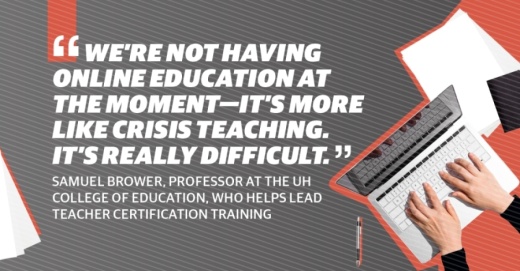The grading policy distributed April 9 has three key provisions: No district grades taken after March 12 can negatively affect a student’s overall average for the course; if a student’s grade in the final grading cycle negatively affects their overall final grade in a course, that final cycle grade will be omitted in the calculation of the final grade for the course; and individual schools have discretion for class assignments and grading, but they have been asked to be flexible and understanding of the burdens and limitations that COVID-19 has placed on students and families.
"This is a difficult time for our community. ... We do not want to add any undue pressure," interim Superintendent Grenita Lathan told the board of trustees April 9. "We do as district, though, have to provide opportunities for our students to learn through an online platform or through paper-based instruction ... and we must document those efforts."
While some parents questioned whether students would be motivated to do any work if there is no harm to their grades, one local education researcher said the best approach right now is "to be as compassionate as we possibly can."
"We can't accurately and fairly measure performance right now. Sure, if this keeps going into the fall, you can prepare for that and put some systems in place, but right now we can't get a good gauge," said Samuel Brower, a researcher and professor at the UH College of Education who helps lead teacher certification training. "We're not having online education at the moment—it's more like crisis teaching. It's really difficult."
Another issue is that the transition to online learning has the potential to expand the digital divide, Brower said. HISD has made it a priority to make contact with every student to assess their technology needs and to ensure they are in communication with teachers.
"This was about making sure our families and teachers were OK and getting technology into hands that needed it," interim Chief Academic Officer Yolanda Rodríguez said. "Our special ed students got priority as far as getting a laptop. Did everyone get a laptop? No, but we did distribute all we had."
Rodríguez said the district had also distributed thousands of Wi-Fi hotspots.
"We distributed as many as we could, and I know that many families, even if they had internet before, now they've lost their job or their income, they're cutting that. They can't pay the bill," she said.
The district said it had reached about 91% of its students by April 9, meaning staff has established two-way communication with over 186,000 students, including 92% of the district's 17,000 special education students, about 90% of its 63,000 English-language learners, and about 84% of its 6,300 homeless students.
Once connected with HISD @ Home, the district's remote learning initiative, student experiences can vary widely depending on the school and the teacher.
"You have some teachers who are very tech savvy, and so they are taking things online and holding class almost as normal," Brower said. "But it's very difficult for others; they are struggling to put things online, and so they're relying more on worksheets."
Some families, meanwhile, have formed support networks to share best practices and advice, such as the HISD@Home Survival Group on Facebook, which has more than 1,300 members.
"Initially there seemed to be a lot of different instructions from schools, as well as individual teachers," said Meg McDonald, who formed the group and cares for a nephew in Lamar High School. "That appears to have died down, as HISD determined best practices for consistency and fairness. These beginning days and weeks are a time of learning and adjustment for HISD, administrators, teachers, parents and students."
The district has also established a hotline, 713-556-4636, to take any questions or concerns about the at-home learning process.





